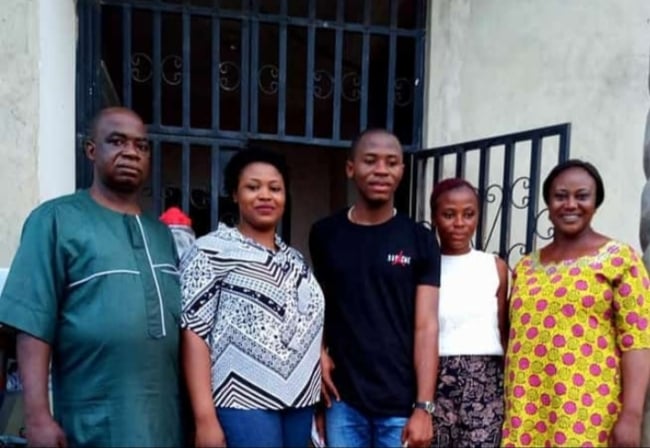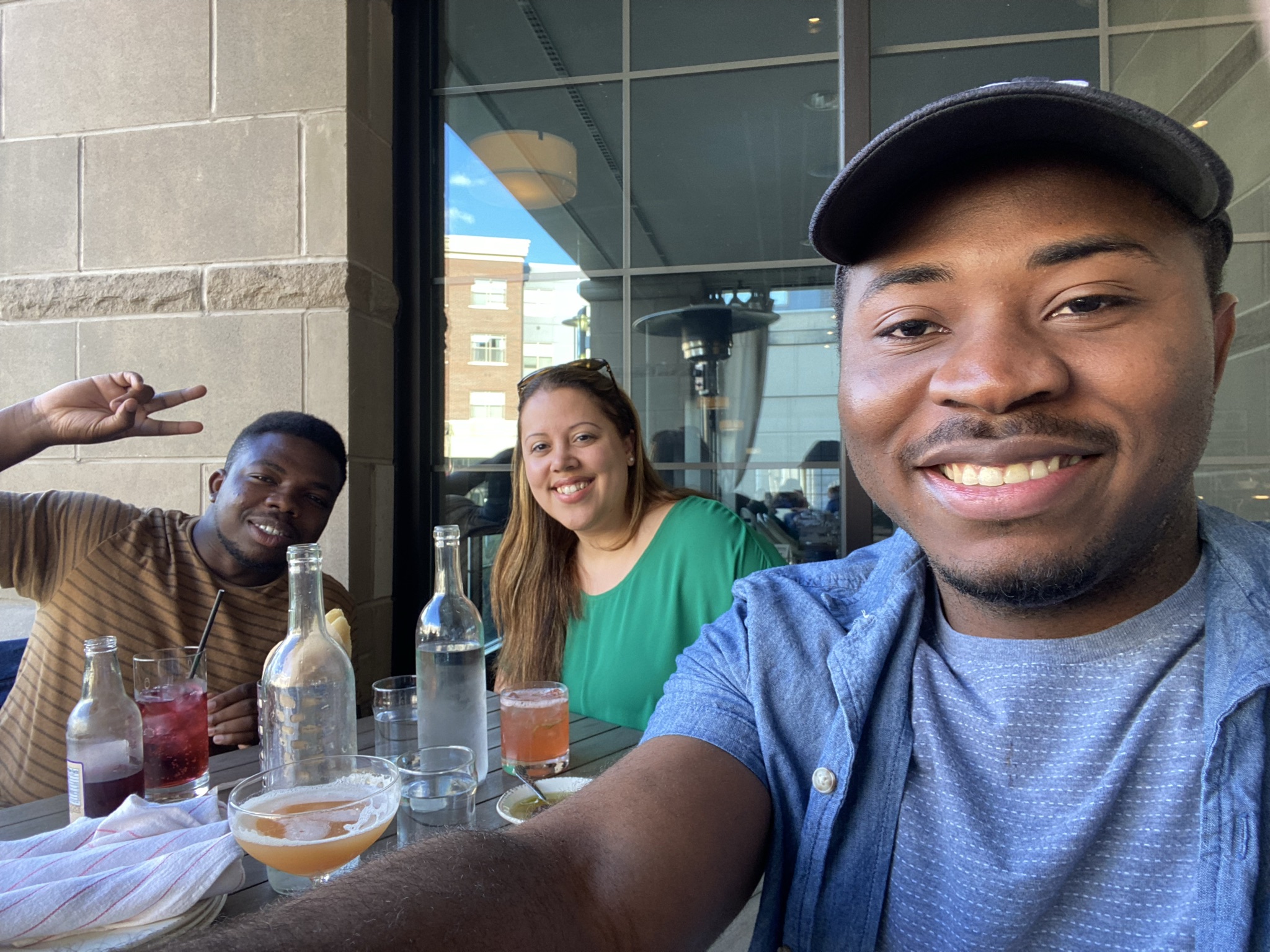You have /5 articles left.
Sign up for a free account or log in.

Gaji with his family, who won’t be able to fly from Nigeria for his graduation this weekend.
Photo courtesy of Basil Gaji.
When Zivile Vebraite graduates from the University of Rochester this weekend, her family won’t be there to celebrate with her. Vebraite, a developmental biology major from Lithuania, said COVID-19 restrictions and the high cost of air travel make it impossible for her parents to attend.
But Vebraite won’t be alone. Megan Hall, who works at the University of Rochester Medical Center, will be at commencement to cheer her on, thanks to the university’s new “fill-in family” program, which matches graduating international students with faculty and staff who serve as surrogates.
“For me, this program is very important, because I have not been home since before COVID, which means that I have not seen my family for a few years,” Vebraite said. “Graduating from college is a big achievement, and it’s important to celebrate it. And when you are alone, it feels different. When I found out about this program, I thought that it’s so nice of U of R to recognize that we need each other.”
The program, launched this year, is designed to help international students like Vebraite feel supported when they walk across the stage this weekend to receive their diplomas. The universitywide commencement will be held Friday, with additional ceremonies and events for individual schools and departments on Saturday and Sunday.
Molly Morrison, assistant dean of international student affairs for undergraduates, came up with the idea after years of personally cheering on international students, many of whom didn’t have family members present at commencement.
“It’s been on my mind for a while, because even in normal years, some of our international students aren’t able to have their families come for the ceremony for lots of different reasons,” Morrison said. “But this year, we’re in person again for the ceremony, but it’s even more difficult for families to come—there’s lockdowns in China, there’s visa restrictions in other countries and flights can be very expensive—so families are having to make some really tough choices.”
She envisioned a formal program where students could be paired with a volunteer family who would cheer for them during the commencement’s name reading, take photos and videos at the ceremony, and maybe take them out for a celebratory meal.
When Morrison put out the call for volunteers in the university newsletter, she was shocked by the volume of responses she got from faculty and staff—even those who aren’t directly connected with undergraduates.
In no time, she had matched 15 international students with 15 volunteer families—and she said she had to turn another 15 families away. She sought to match students with families that have similar interests, or with faculty or staff who work in the same school or program. The students connected with their surrogate families via email.
“Some of the students were unexpectedly not able to have their family come, so it’s very disappointing,” Morrison said. “Others knew that that would never be an option for them. So having somebody there for them specifically is really heartwarming because we have receptions that they can go to together.”
Vebraite’s fill-in, Hall, is an outpatient access specialist at the university hospital, which is fitting, since Vebraite wants to be a health project coordinator.
“Having someone who is in a similar area as me just allows me not to feel alone and allows me to understand that someone cares about me and can help me,” Vebraite said. “It is such an important support, especially now that I’m graduating and starting a new chapter.”
Hall said she was inspired to volunteer because she’s been in similar situations, with her family unable to attend important moments in her life.
“I read through the newsletter and I’m like, ‘Oh, that’s sweet,’ because I’ve honestly never seen something like that before,” Hall said. “The program resonates with me because I didn’t always have somebody there for my events.”
Hall has several surprises planned for Vebraite for the universitywide commencement Friday and said she’ll try to make it to her department ceremony Saturday.
“The whole thing is, you have to remember to put yourself in their shoes,” Hall said. “This is a big day. They’re graduating from a really good school, and they don’t have anybody there. I mean, they’ve got their friends that they went to school with, but having someone there for you just makes it more memorable.”
Graduating senior Basil Gaji, an electrical and computer engineering major from Nigeria, expressed gratitude for the program. He said his family wasn’t able to fly out for commencement because of the cost and because they didn’t have enough time to apply for a visa.

Gaji’s “fill-in family” member is Crystal Cusimano Figueroa, senior director of orientation and first-year programs and summer and continuing studies, whom he has known since his freshman year. Gaji said Cusimano Figueroa eased his adjustment to the university, even helping him get warm clothes to prepare for the upstate New York winter.
Now Cusimano Figueroa and her husband will join him for his department’s commencement Saturday, followed by lunch. Gaji said Cusimano Figueroa has been instrumental during his time at the University of Rochester, and he calls her a close mentor.
“She has been there for me whenever I needed help, so she’s like my family,” Gaji said. “She’s my community here away from home. And so even though my actual family will not be in attendance, I feel like there’s somebody supporting me.”
Morrison said the fill-in family program has proven so successful that the university plans to offer it again next year.
“The surprising part was not the need from the students, but from the community stepping up for students,” Morrison said. “So I think it’s a win-win to get the community involved in learning about international students and creating that connection, even as the students go on to their next steps in life.”




